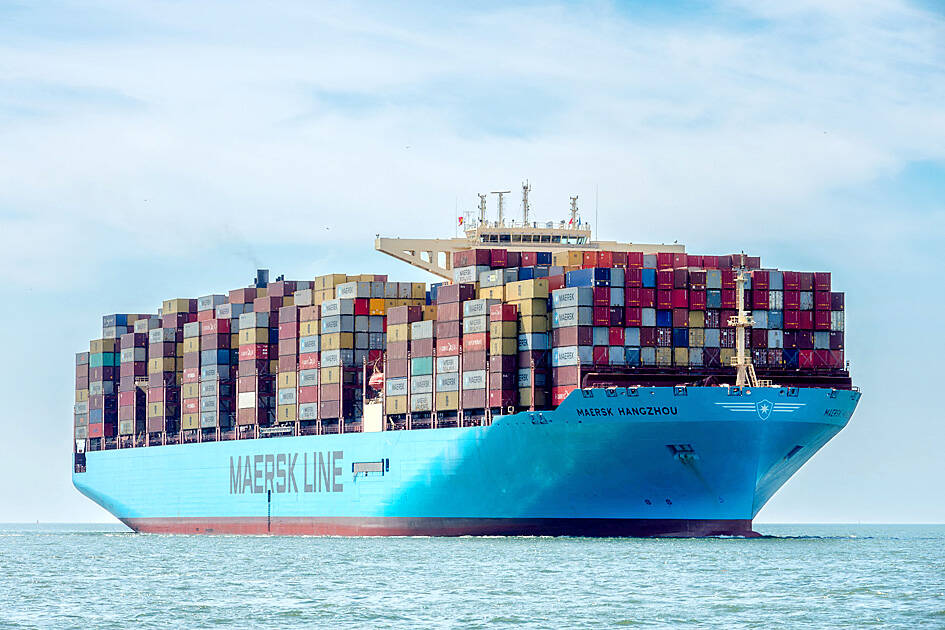The disruption to container shipping traffic in the Red Sea is increasing and is expected to reduce the industry’s capacity between the Far East and Europe by up to 20 percent in the second quarter, shipping group A.P. Moller-Maersk A/S said on Monday.
Maersk and other shipping companies have diverted vessels around Africa’s Cape of Good Hope since December last year to avoid attacks by Iran-aligned Houthi militants in the Red Sea, with the longer voyage times pushing freight rates higher.
“The risk zone has expanded, and attacks are reaching further offshore,” Maersk said in an updated advisory to customers.

Photo: This Image has been supplied by a third party, Reuters
“This has forced our vessels to lengthen their journey further, resulting in additional time and costs to get your cargo to its destination for the time being,” it added.
By routing traffic away from the Suez Canal, Maersk estimated that the container industry’s capacity between the Far East and northern Europe and the Mediterranean would be cut by between 15 and 20 percent in the April-to-June quarter.
A company spokesperson said the situation in the Red Sea remained complex and continued to evolve.
The Danish group, viewed as a barometer of world trade, last week said that shipping disruptions were expected to last at least until the end of the year, although Germany’s Hapag-Lloyd AG sounded a slightly more optimistic note, saying it believes the crisis can be overcome before the end of this year.
France’s CMA CGM SA is still sending some vessels via the Red Sea escorted by French or other European navy frigates, but the majority of its ships are being rerouted around Africa, chief executive officer and chair Rodolphe Saade told daily newspaper Le Monde.
“The problem is that you have to call at ports that are not the final destination and to transship onto smaller vessels,” Saade told the newspaper in an interview published yesterday.
“Tangiers is saturated and alternatives need to be found — like [Spain’s] Algeciras or Valencia,” he added.
The knock-on effects of voyages around Africa included bottlenecks and so-called vessel bunching, where several ships arrive at port at the same time, as well as equipment and capacity shortages.
“We are doing what we can to boost reliability, including sailing faster and adding capacity,” Maersk said, adding that it had so far leased more than 125,000 additional containers.
“We have added capacity, where possible, in line with our customers’ needs,” the company said.

Semiconductor business between Taiwan and the US is a “win-win” model for both sides given the high level of complementarity, the government said yesterday responding to tariff threats from US President Donald Trump. Home to the world’s largest contract chipmaker, Taiwan Semiconductor Manufacturing Co (TSMC, 台積電), Taiwan is a key link in the global technology supply chain for companies such as Apple Inc and Nvidia Corp. Trump said on Monday he plans to impose tariffs on imported chips, pharmaceuticals and steel in an effort to get the producers to make them in the US. “Taiwan and the US semiconductor and other technology industries

SMALL AND EFFICIENT: The Chinese AI app’s initial success has spurred worries in the US that its tech giants’ massive AI spending needs re-evaluation, a market strategist said Chinese artificial intelligence (AI) start-up DeepSeek’s (深度求索) eponymous AI assistant rocketed to the top of Apple Inc’s iPhone download charts, stirring doubts in Silicon Valley about the strength of the US’ technological dominance. The app’s underlying AI model is widely seen as competitive with OpenAI and Meta Platforms Inc’s latest. Its claim that it cost much less to train and develop triggered share moves across Asia’s supply chain. Chinese tech firms linked to DeepSeek, such as Iflytek Co (科大訊飛), surged yesterday, while chipmaking tool makers like Advantest Corp slumped on the potential threat to demand for Nvidia Corp’s AI accelerators. US stock

The US Federal Reserve is expected to announce a pause in rate cuts on Wednesday, as policymakers look to continue tackling inflation under close and vocal scrutiny from US President Donald Trump. The Fed cut its key lending rate by a full percentage point in the final four months of last year and indicated it would move more cautiously going forward amid an uptick in inflation away from its long-term target of 2 percent. “I think they will do nothing, and I think they should do nothing,” Federal Reserve Bank of St Louis former president Jim Bullard said. “I think the

SUBSIDIES: The nominee for commerce secretary indicated the Trump administration wants to put its stamp on the plan, but not unravel it entirely US President Donald Trump’s pick to lead the agency in charge of a US$52 billion semiconductor subsidy program declined to give it unqualified support, raising questions about the disbursement of funds to companies like Intel Corp and Taiwan Semiconductor Manufacturing Co (台積電). “I can’t say that I can honor something I haven’t read,” Howard Lutnick, Trump’s nominee for commerce secretary, said of the binding CHIPS and Science Act awards in a confirmation hearing on Wednesday. “To the extent monies have been disbursed, I would commit to rigorously enforcing documents that have been signed by those companies to make sure we get